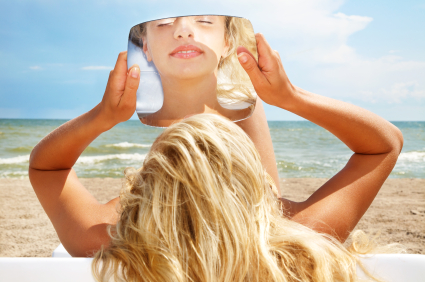Did you know that since the 1930s, skin cancer rates have skyrocketed right alongside the sales of commercial sunblock?
In fact, the per capita melanoma rate has increased 1,800 percent since the first commercial sunscreens were introduced.1
Seems to us that the chemicals marketed to “protect” us from the sun aren’t doing very much good. In fact, they’re harming us: Chemical sunscreens have at least four proven carcinogens.
The sun is good for you—that’s been proven also—but burning is not. So, how do you protect yourself without slathering on loads of toxins? Your first line of sun protection starts on the inside and includes some things you may not have thought of. And if you’re guilty of our top five “no-no’s,” then you’re not as protected as you can be…
| Want to know the strength of the sun’s rays, use the shadow test. If your shadow is shorter than you are, the sun’s rays are the strongest. During those times definitely make sure to protect yourself. |
1. Skipping the veggies – Carotenoids are nature’s own sunblock. In fact, plants use them as sunscreen. Carotenoids are powerful antioxidants that protect your skin from free radical damage. You get loads of them from greens and brightly colored fruits and vegetables. These increase the orange and yellow pigments in your skin, which blocks the sun’s rays.2 People with the highest intake of carotenoids are six times less likely to develop skin cancer. The more fresh color you can add to your diet, the better sun protection you’ll have from the inside out. Foods rich in carotenoids include melons, apricots, carrots, red peppers, squash, and sweet potatoes.
2. Not reading your pill bottle – We get it. You don’t want to read that pamphlet that comes with every one of your prescriptions. Who does? But many prescriptions—as well as over-the-counter pain relievers and even some herbal supplements—can increase your sensitivity to the sun. Some medicines can even cause a phototoxic reaction in your skin. That harmful, sunburn-like damage can happen pretty quickly…sometimes within minutes.3 Antihistamines, antibiotics, anti-inflammatories, and some diabetes and heart medications can cause sun sensitivity. Check the labels or the information included with your prescription. If you’re still not sure, check with your physician or pharmacist.
3. Wearing perfume – Fragrances can make your skin more sensitive to UV rays, causing irritation. That even includes scents from soaps and lotions. And wearing perfume increases your chances for developing a sun allergy. That causes lasting redness, itching, pain, and blisters or hives.4 Enjoy the perfume of the sand and surf on your skin instead.
4. Staying out all day – Sometimes we let our guard down and stay out longer because the sun is peeking and hiding. But you can get severely sunburned on a cloudy day, especially in southern climates. Up to 80 percent of the sun’s UV rays can pass through clouds.5 After you’ve gotten about 20 minutes of sunshine, block the rays with an umbrella, clothes, hat, and sunglasses.
5. Forgetting to take your Vitamin E – Like vegetables and fruits, vitamin E protects your skin from the inside out. Experts consider vitamin E to be the most important antioxidant for the skin because it protects cell membranes and prevents damage to enzymes associated with them.6 Topical vitamin E lotions and oils protect your skin from sunburn and free radical damage. And if you do get a sunburn, vitamin E helps reduce redness and UV-induced skin swelling and thickness after sun exposure.7
The sun is good for you. It increases your production of vitamin D, helps you sleep better, and can actually help you lose weight. But burning can be painful and downright dangerous. And regular sunscreens could be just as hazardous. That’s why we recommend you keep these five tips in mind this summer.
Like this Article? Forward this article here or Share on Facebook.
References:
1 http://institutefornaturalhealing.com/2012/07/sunscreen-snake-oil-of-the-21st-century/
2 http://www.menshealth.com/mhlists/diet_plan_for_40s/Cancer-Prone_Skin.php
3 http://www.webmd.com/skin-problems-and-treatments/features/beware-of-sunburn-boosters?page=2
4 http://www.mayoclinic.com/health/sun-allergy/ds01178/method=print
5 http://www.cnn.com/2012/07/10/living/guide-to-sun-safety
6 http://www.medscape.com/viewarticle/429171
7 http://lpi.oregonstate.edu/infocenter/skin/vitaminE/

